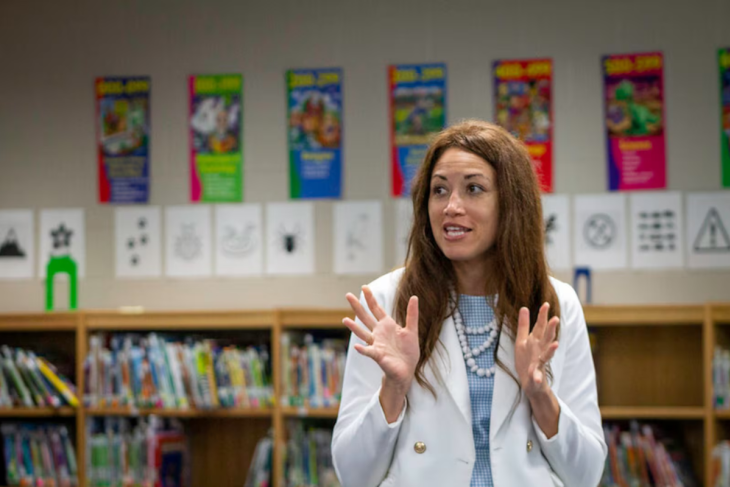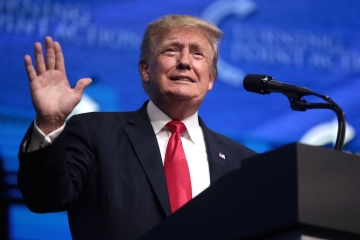Let’s get this straight immediately: If you’re an educator, you’re a culture war combatant. It cannot be avoided. It’s literally your job.
Schools exist for the purpose of cultural transmission. They signal to children which books are worth reading, ideas worth embracing, who are history’s heroes and villains and, through hundreds of daily interactions with adults, the values, beliefs, and behaviors we praise or condemn. Education is not now and can never be values-neutral. Whether intentionally or by neglect, schools and the adults who staff and run them cannot help but shape the moral and intellectual lives of children.
So, no more hand-wringing about schools and “culture wars,” please. But the conservative response to education policy cannot focus solely on purging ideological threats; it must pursue with equal zeal competence and effectiveness. As last week’s release of NAEP reading and math scores vividly illustrated, schools are continuing to fail at their rock-bottom basic task of educating students.
A core conservative critique is that public schools have become hostile to the country that funds them, prioritizing ideological activism over academic excellence. It’s a valid and important critique. Yet, while conservatives rightly challenge ideological capture, they must also recognize that the greatest failure of K–12 education is not ideological but operational. Schools have long struggled to teach children to read and perform basic math at high levels. Before DEI, SEL, and CRT in schools became culture war flashpoints, systemic issues—such as poor teacher training, ineffective curricula, and weak accountability—were already limiting student success.
The Conservative Contradiction on Competence
Conservatives recently expressed justifiable outrage when reports suggested that the Los Angeles fire department prioritized DEI initiatives over firefighting competence. L.A. Fire Chief Kristin Crowley came under intense criticism for pledging at her confirmation to ensure that “diversity is celebrated and valued, and that equity and inclusion are intertwined into every policy, procedure, and practice.” As wildfires devastated the city, Elon Musk posted screenshots of the LAFD’s racial equity action plan on social media adding, “They prioritized DEI over saving lives and homes.”
The conservative position was clear and correct (and not even limited to the political right): Public institutions must focus on their primary responsibilities, not ideological distractions. Yet, when Penny Schwinn was nominated for Deputy Secretary of Education last month, she faced a conservative backlash for the opposite reason—focusing on student achievement rather than pursuing ideological battles. “I see it as extraneous politics, and my job is to educate kids,” she told The 74 when she stepped down from her position as Tennessee’s education chief last year.
Critics, including John Rich, Robby Starbuck, and local Moms for Liberty chapters accused Schwinn of supporting mask mandates, well-being checks during Covid, and failing to purge woke curricula from schools. They portrayed her as insufficiently combative in the culture war, and thus an unworthy candidate—despite her strong record on literacy, school choice, and curriculum improvement. Christopher Rufo, an influential conservative education activist, defended Schwinn, highlighting her opposition to explicit materials in schools, her support for school choice, and her efforts to increase curriculum transparency. But that defense by conservatives’ highest-profile culture warrior seems to have done little to mollify Schwinn’s critics. The contradiction is clear and ironic: conservative critics want a culture warrior, not an administrator focused on competent governance and delivering results.
If conservatives demand competence from fire departments and other government services, why not demand it from schools? Schwinn’s leadership in Tennessee was marked by a laudable focus on literacy and teacher training—exactly the priorities conservatives should want in an education leader. Her tenure in the Volunteer State was defined by a clear-focus on student achievement: She championed high-quality instructional materials, launched a statewide tutoring program, and revamped reading instruction based on the science of reading.
Opposition to her hints at a troubling myopia in conservatives’ vision for K-12 education, one that see schools exclusively as a battleground for culture wars rather than as critical institutions capable of competently getting children to minimally acceptable levels of literacy and numeracy. It also elides a fundamental truth: There was no golden age of excellence before CRT and DEI, and not even before there was a U.S. Department of Education. Long before these issues became political flashpoints, systemic challenges—poor instructional quality, and stagnant academic outcomes—plagued American education. If the conservative education agenda becomes solely about ideological purges rather than academic excellence, it will fail to improve schools in any meaningful way.
My colleague Rick Hess put it well: “Restoring common sense to classroom culture isn’t a distraction. It’s a necessary first step if we want educators focused on the work of educating. But then what? That’s when we need education leaders who unapologetically embrace the stuff of learning: academics, rigor, good teaching, and student outcomes.”
Public trust in schools is eroding not just because of ideological concerns, but because of decades of academic failure. Conservatives cannot demand competence from police and fire departments while dismissing it in education. Penny Schwinn’s nomination is an opportunity to refocus on what matters: ensuring that America’s schools fulfill their twin missions of cultural transmission and competence.




